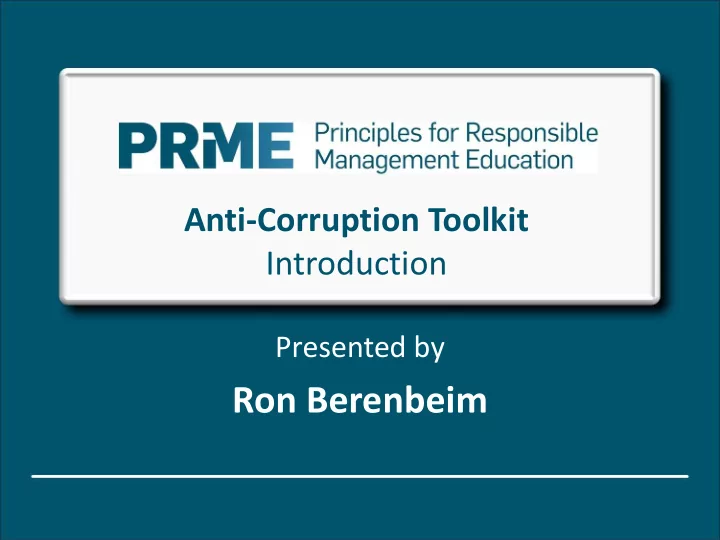

Anti-Corruption Toolkit Introduction Presented by Ron Berenbeim
THE SIX PRME PRINCIPLES Principle 4 - Research: We will engage in Principle 1 - Purpose: We will conceptual and empirical research that develop the capabilities of advances our understanding about the students to be future role, dynamics, and impact of generators of sustainable value corporations in the creation of sustainable for business and society at large social, environmental and economic value. and to work for an inclusive and sustainable global economy. Principle 5 - Partnership: We will interact with managers of business corporations to Principle 2 - Values: We will extend our knowledge of their challenges incorporate into our academic in meeting social and environmental activities and curricula the responsibilities and to explore jointly values of global social effective approaches to meeting these responsibility as portrayed in challenges. international initiatives such as the United Nations Global Principle 6 - Dialogue: We will facilitate Compact. and support dialog and debate among educators, students, business, Principle 3 - Method: We will government, consumers, media, civil create educational frameworks, society organizations and other interested materials, processes and groups and stakeholders on critical issues environments that enable related to global social responsibility and effective learning experiences sustainability. for responsible leadership.
WHO PARTICIPATES 4% 14% 12% 8% 21% 7% 34% • Over 650 business schools/ management- related academic Latin America North America institutions and universities Western Europe Eastern Europe & CIS from 83 countries Middle East & Africa Asia • 42 of the Financial Australia & New Zealand Times ’ top 100 Global MBA Ranking in 2016
REGIONAL PRME CHAPTERS Nordic CEE countries Nordic (Central & Eastern countries Europe) UK & Ireland D-A-CH (German-speaking Iberian Europe) (Portugal & Spain) East Asia North America ASEAN+ Australia & Latin America New Zealand & the Caribbean India Brazil South Middle East/ Asia North Africa
PRME WORKING GROUPS PROJECTS AND REPORTS Anti-Corruption Toolkit Poverty, a Challenge for Gender Equality Management Education
The education problem… The educational approach to tackling corruption can be quite fragmented and often un-coordinated
Business education establishments need help… They shouldn’t have We need to pass on to reinvent the good practice from wheel… around the world
The toolkit background… Developed by educators and experts from Business Schools around the world
The toolkit background… Promoting curriculum change and spreading good practice
Tried and tested… How do we know the anti-corruption toolkit works? • Piloted in 2013 academic year by higher education institutions in 10 different countries • Provided a range of diverse geographic and cultural contexts • Pilot countries included: • Russia • Nigeria • Argentina • India • Western countries • Introduced adapted Toolkit modules into curriculums by integrating with existing course materials
Continuous feedback and improvement… PRME reviewed feedback from pilot scheme and incorporated improvements into revised toolkit Toolkit is Content regularly open source updated and expanded
In a nutshell…
Recommend
More recommend